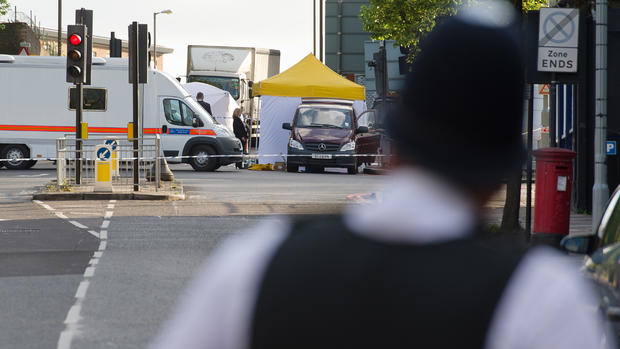London soldier slaying homegrown Islamic extremism?
This story contains video that some viewers may find graphic.
LONDON "We swear by almighty Allah we will never stop fighting you. We must fight them as they fight us." Those were the words of a man suspected of brutally slaying an active-duty British soldier on Wednesday in broad daylight.
The two suspects' identities had not been confirmed Thursday morning, but multiple British media said they were both British, possibly even local south Londoners -- one possibly of Nigerian origin.
It wasn't clear whether either man had actually ever lived outside of the U.K. -- the man who spoke on the video sounded very much like a London native.
So why would men from Britain wage such a violent "eye-for-an-eye" attack in the name of defending Muslims in "our lands," as the man in the video claimed?
The language used by the man in the infamous video tirade, and his strong London accent, could indicate that he was sucked into a long-fomenting Islamic extremist movement native to Britain -- not necessarily coached or led by any terror organization based on foreign soil.
London Mayor Boris Johnson said Thursday morning that the blame for the murder could be pinned "wholly and exclusively in the warped and deluded mindset of the people who did it."
The question for investigators in London then, as it was for those in the U.S. following the Boston Marathon bombing, is who warped and deluded the minds of the two men allegedly behind the attack.
Thousands of propaganda videos -- everything from extremist religious sermons, to carefully selected clips from war zones in Afghanistan and Syria, to video demonstrations on how to build a bomb from household items -- are readily available on the internet to anyone interested in seeking the content out. It is possible that the suspects were self-radicalized; inspired entirely by what they might have read or seen online.
But there are other, more tangible radicalizing forces available to -- even seeking out -- disaffected young men in Britain.
A handful of Islamic activists in the U.K. have made it their full-time job to recruit and indoctrinate young British men into an extremist brand of the religion. They preach that the U.K. government is working with the U.S. and other Western nations in a war against Islam. It is the same message espoused and pushed online by al Qaeda.
Radical Islamic activists like London lawyer Anjem Choudary are careful in their street preaching and online propaganda to never specifically call for violence. They know incitement is illegal, and they're smart enough to stay on the right side of the letter of the law -- to be able to continue propagating their message.
But while Choudary and others like him don't publicly call for attacks, they're not shy about defending them, or offering a rational for them.
"As we live amongst you and propagate our belief, it is also our responsibility to warn our neighbors of the potential repercussion of their actions for us all," Choudary said in a statement released to media outlets just a week before Wednesday's attack. He teaches his followers (his almost-weekly London rallies can draw dozens of young men) that attacks on Britain and on British people abroad are caused by "the polices of governments which are vehemently anti-Islam and anti-Muslim and seem hell bent on provoking Muslims."
"Woolwich is a lesson for us all, we must take the role of the UK in Muslim land seriously & its harsh repercussions on the streets of the UK," Choudary tweeted just hours after the attack in south London's economically depressed Woolwich neighborhood, where he spent at least part of his own young life.
Speaking to CBS News Wednesday night, after the murder, Choudary said he thought he might have recognized one of the suspects from his rallies or sermons.
Separately, he told the London Evening Standard that he did know one of the suspects, by the adopted Islamic name, Mujahid.
"He attended our meetings and my lectures," Choudary told the paper, adding that, "I wouldn't describe him as a member" of al Mujaharoon, Choudary's organization. "There were lots of people who came to our activities who weren't necessarily members."
Choudary said the young man "disappeared about two years ago. I don't know what influences he has been under since then."
The suspect seen in the video defending the attack on Wednesday may or may not have been influenced by Choudary, but the language he used was straight from Choudary's script.
Mayor Johnson said Thursday morning it would be "wrong to try and draw any link between this murder and British foreign policy."
While Choudary and his followers take the opposite view, many in Britain will agree, and they may start asking more pointed questions about Britain's domestic policy, instead.
When Choudary's street rallies crop up, they are usually protected, even encircled by London police officers -- to prevent angry onlookers or counter-demonstrators from attacking him and his disciples.
The freedoms of speech and protest are enshrined in British law, and few would want to see those tenets challenged.
Once investigators have had time to scrutinize the recent past of the suspects in Wednesday's attack, however, any links discovered to men like Choudary may renew the debate over where exactly lies the fine line between defending and rationalizing extreme violence, and inciting it.
